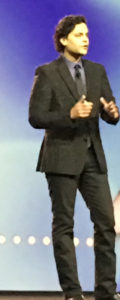How did Ravi Hutheesing shape his career path?

At the 2017 National Conference on Education in New Orleans, LA, Ravi Hutheesing, keynote speaker at the General Session, explained how his educational background and personal development shaped his career path to become a rock star, aviator, entrepreneur and cultural diplomat. By ancestry, Hutheesing is of German and Indian descent. He is also a member of the Nehru-Gandhi family. The following is an excerpt of Hutheesing’s journey:
 As a child, Hutheesing did not like school because it was boring. He said there was no personalized curriculum relevant to his interest of becoming a rock star. Instead, Hutheesing considered dropping out of school to start a professional career. He did not see the context or relevancy of classwork dealing with such things as facts, figures and formulas.
As a child, Hutheesing did not like school because it was boring. He said there was no personalized curriculum relevant to his interest of becoming a rock star. Instead, Hutheesing considered dropping out of school to start a professional career. He did not see the context or relevancy of classwork dealing with such things as facts, figures and formulas.
With the influence of his music teachers, Hutheesing decided to remain in school. To help him overcome his frustration, Hutheesing created his own personalized curriculum by starting a band in high school. He also worked a job that enabled him to socialize and learn about the lifestyles of baby boomers.
In an effort to advance his education, Hutheesing attended college but found it boring as well. He said the classes did not connect with his becoming a rock star entertainer, so he paid his professors to tutor him rather than attend classes. In 1997, Hutheesing performed as guitarist for the band Hanson at Madison Square Garden in New York, and the band became the top selling band in the world. The band played before 30,000 screaming millennials nightly, said Hutheesing. During that experience, Hutheesing said he learned more from the performance industry than he could have ever learned in school.
As a contextual learner, Hutheesing highlighted the significance of his K-12 experience. He gave credit to people such as the superintendent and teachers who were influential in his education although he could not see this during his teen years. The classwork was about learning facts, figures and formulas and had no relevancy to the real world, said Hutheesing. It was through his experience in the cockpit of a plane that he learned to fly and understand the relevancy of his K-12 education. His aviation training allowed him to apply learning in geometry, geography and math to application. All the facts, figures and formulas he was taught in school suddenly had context and meaning, said Hutheesing.
As a cohort of Generation X, Hutheesing exemplified the characteristics of a millennial. In fact, he described the millennials as being creative, full of ideas and capable of adapting to anything. They are people who want education to be relevant. They are concerned about people instead of products and profits. They are entrepreneurs and very interested in music. They want to be defined by their passion and make a difference in the world, said Hutheesing.
As a cultural diplomat of the U.S. Department of State, Hutheesing is making a difference in the world by creating programs on entrepreneurship and youth leadership in countries such as Russia and Indonesia that foster cultural exchange and mutual understanding. He is drawing on his experience of being around millennials and baby boomers. He noted that millennials and baby boomers have so much in common but they focus on different things. Thus, he is teaching ways to bridge the gap between the two generations and others so they can learn from each other and excel together in a global economy. Hutheesing concluded that we must go back to liberal education to make sure students are well rounded and creative. It is not what students know, but what can they do in the arts, science and humanities, said Hutheesing.
Dr. Ronald Holmes is the author of 15 books and publisher of “The Holmes Education Post,” an education focused Internet newspaper. Holmes is a former teacher, school administrator, test developer and district superintendent. He can be reached at [email protected]

